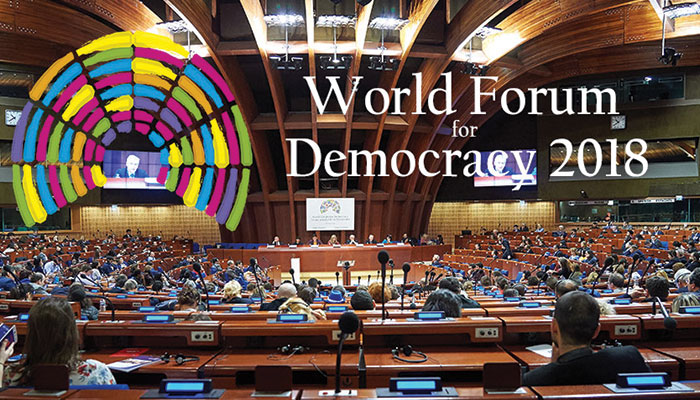[Pháp] Cơ Hội Giành Chuyến Đi Toàn Phần Đến Strasbourg, Pháp Tham Dự Diễn Đàn Về Dân Chủ "World Forum For Democracy" 2018
Deadline: May 30, 2018
The call is open for labs is open. Apply to get to present your initiative at the World Forum for Democracy. The labs, which are the heart of the World Forum for Democracy, will this year focus on issues to resolve specific problems with regards to inequalities between women and men thanks to the critical analysis of tested initiatives.
The World Forum for Democracy is a unique platform for political decision-makers and activists to debate solutions to key challenges for democracies worldwide. The World Forum for Democracy 2018 will be dedicated to gender equality and women’s rights.
By identifying and analysing experimental initiatives and practices, the Forum highlights and encourages democracy innovations at the grassroots and their transfer on a systemic level in order to strengthen the foundations of democratic societies. The Forum thus contributes to the evolution of democracy towards more participatory and inclusive structures and institutions.
Call for Labs
The World Forum for Democracy will take place on 19-21 November in Strasbourg, France. The Council of Europe’s Democracy Innovation Award is given to the most popular initiative, voted upon by the Forum participants. The key conclusions and lessons learnt from the labs will be discussed in a summing up session in order to prepare the overall conclusions of the Forum.
Funding
Travel and accommodation expenses may be covered by the Council of Europe if required.
Eligibility
- Open to any public or private organisation around the world. One presenter for the selected initiatives will be invited to Strasbourg to take part in the World Forum.
Organisations/institutions worldwide are invited to express their interest in presenting an initiative aimed at changing the diverse range of experiences women are facing. These initiatives should be able to share evidence about efforts that have led to the strengthening and protection of women’s rights and/or to a balanced representation of women and men in public, political and/or economic affairs.
Examples of possible initiatives and their challenges (non-exhaustive):
- Understanding of how gender inequality works.
- Fighting gender-based discrimination resulting from patriarchal attitudes and related social norms
- Victim support and prevention
- Women’s rights movements influencing decision-making structures from the local to the global level, reaching broad audiences and addressing root causes of gender inequality.
- Political parties managing to establish gender parity within their structures.
- Supporting women from diverse backgrounds running for elected office, e.g. career advice, access to campaign finance, fighting against intimidation during campaigns.
- Monitoring initiatives, e.g. for the implementation and impact of quota systems, or the impact of policy changes for women of diverse backgrounds.
- Closing data gaps about persisting gender inequalities, e.g. unpaid work and participation in the informal economy, representation in local governance, political organisations etc.
- Fighting gender stereotypes, e.g. in the media, in advertisement, etc.
- Increasing competition between companies for gender equality.
- Doing business differently (e.g. actors of the circular economy, sharing economy etc.) to promote women’s engagement in public affairs.
- Strengthening women entrepreneurs and their ecosystems, including advisors, supporters and finance providers, with a special focus on those that support women in the transition to digitalised economies.
- Digital technologies fighting gender inequalities, e.g. through increasing transparency about gender pay gaps, strengthening support networks between women etc.
- Abolishing male bias in artificial intelligence.
- Religious actors that foster women participation in public political spaces, public institutions, elected offices, and the economy.
Application
Submissions should be made by answering the questionnaire in the appendix (link below) and sending it to [email protected] by 30 May 2018. The World Forum Task Force will select the most interesting and relevant proposals in June 2018.
Click here to apply. For more information, visit World Forum for Democracy.
468 lượt xem
